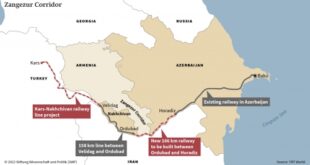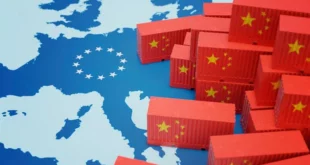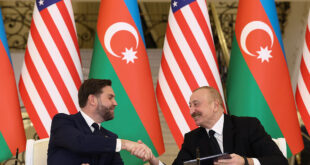 Late in January, Chechen puppet president Ramzan Kadyrov declared that only 60-70 “militants” remained in Chechnya. Kadyrov had promised to eliminate all rebels before the arrival of spring. “This is their last winter, believe me,” Ramzan said repeatedly (Interfax, January 23). Why the Chechen president made such a bold statement is unclear, but three months later, it is safe to say that it has seriously damaged Kadyrov’s reputation- above all in the eyes of the Russian authorities.Having analyzed the situation in Chechnya, the people in the Kremlin and federal security officials have come to a disappointing conclusion: the reconstruction of Chechnya has not affected support for the insurgency from the Chechen population and young Chechen men continue to join the rebel ranks.
Late in January, Chechen puppet president Ramzan Kadyrov declared that only 60-70 “militants” remained in Chechnya. Kadyrov had promised to eliminate all rebels before the arrival of spring. “This is their last winter, believe me,” Ramzan said repeatedly (Interfax, January 23). Why the Chechen president made such a bold statement is unclear, but three months later, it is safe to say that it has seriously damaged Kadyrov’s reputation- above all in the eyes of the Russian authorities.Having analyzed the situation in Chechnya, the people in the Kremlin and federal security officials have come to a disappointing conclusion: the reconstruction of Chechnya has not affected support for the insurgency from the Chechen population and young Chechen men continue to join the rebel ranks.
Â
On April 10, General Arkady Yedelev, the commander of the “anti-terrorist” forces in the North Caucasus, said at a meeting in the Chechen capital Grozny that there were 500 rebel squads in the Caucasus and that their ranks were growing (Kavkazky Uzel, April 11).
Â
Seeing that economic development is not reducing support for the rebels, officials found a new explanation for why the insurgency remains so popular: the influence of “radical Islam.” At the same meeting in Grozny, Vladimir Kulishov, the head of the Chechen branch of the Federal Security Service (FSB), complained that “after decades of state atheism most believers have a vague idea of what Islam is.” Kulishov said that the FSB was taking part in the work of a commission of the Chechen government to license religious schools in the republic (RIA Novosti, April 10).
Â
Thus it would appear that officials are looking for explanations for why the Chechen insurgency remains alive. At the same time, they need a scapegoat, a political leader who can be held responsible for failures of the anti-insurgency campaign in the region. Ramzan Kadyrov and his government are the first choice for the role of the scapegoat. On March 28, Kavkazky Uzel reported that the Chechen branch of the federal Prosecutor General’s Office blamed the republican financial control bodies under the Chechen president ‘s authority for failing to punish those officials in the Chechen government who embezzle money from the state budget. On April 29, the federal Audit Chamber declared that it had found mistakes in the planning of the Chechen budget (Yuga, April 29).
Â
It is clear that such critical statements concerning the financial policy of the Chechen authorities are aimed at Ramzan Kadyrov personally, given that Kadyrov is constantly boasting about how much he has done to make life in Chechnya better.
Â
A new round of disagreements between Kadyrov and Moscow was provoked by an extremely unsuccessful winter campaign by the federal forces in the region. None of leaders of the Chechen rebels-such as Dokka Umarov, Tarkhan Gaziev, Aslanbek Vaduev, Usman Muntsiev, Khusein Gakaev and many others-was liquidated, detained or even hurt during the winter. Special forces managed to destroy only one rebel group-headed by Uvaise Techiev-during the two winter months. The destruction of Techiev’s group was the only real success of the federal forces’ winter campaign in Chechnya. Human rights activists point to the decrease in kidnappings in Chechnya, but they do not note that this could simply be the result of intelligence problems on the part of the police and the FSB. If you do not know who is involved in insurgent activities, you do not know whom to detain, and it is no secret that most of the kidnappings that occur in Chechnya are in fact arrests by security forces.
Â
So, why did the rebels in Chechnya make it through the winter so successfully? The insurgents themselves explain this by their change in tactics: most of them now live permanently in their mountain bases and do not come into the villages. At a meeting with rebels that took place in Chechnya last year, Dokka Umarov, the top leader of the Caucasian insurgency, explained the need for this tactic. “As we know, the winter here (in Chechen mountain areas-AS) is harsh, but despite this a mujahid should spend the winter in the forest,” he said. “Because in the forest, when you are armed, well-equipped … you are able to defend your honor when you have weapons and equipment close at hand. When a mujahid comes home unarmed in order to warm up or to sleep, the enemies can attack him and try to capture or to kill him. So in order to prevent such things, we should stay here, in the forest, and spend the winter there too” (the video has been posted on YouTube, and can be seen at: http://youtube.com/watch?v=SxiULCtU4Dk).
Â
It is well known that neither the Russian nor the pro-Russian Chechen troops are as good at mountain warfare as the guerrillas, for whom the Chechen mountain area is real home. The clashes that took place this winter in the Chechen mountains (Kurchaloi, Nozhay-Yurt, and Vedeno districts) have proven this once again. Russian forces and Chechen policemen suffered serious casualties during these clashes, but their operations had no real results. By staying in the mountains, the rebels prevented the security forces from using their main method of fighting the insurgents-that is, to search, surround and kill rebels one by one in settlements.
Â
Meanwhile, with the arrival of spring, the rebels started using the tactics of the police and of other security forces against them. Rebel squads move from mountain bases in the forests into Chechen settlements, where they kidnap or kill policemen and the most active officials of Kadyrov’s government. On April 17, three rebels kidnapped and killed Ali Gaytamurov, the head of the Sunzha district police department. Late at night on April 20, a rebel squad entered the village of Shalazhi and kidnapped two policemen and one official from the Chechen Ministry of Justice (Chechen Information Center press release, April 21). This April, rebels attacked policemen and burned administrative buildings in several villages of the Urus-Martan, Achkhoi-Martan, Sunzha and Vedeno districts. Kadyrov loyalists are their main targets. Dokka Umarov and other rebel commanders understand that by weakening Kadyrov’s power in Chechnya they damage the Kremlin’s policy of Chechenization in the republic. Chechenization continues to be the main problem for the insurgency and the rebel leadership’s top priority is to disrupt it. Dokka Umarov said that “there are 160,000 workers in Chechnya who went to work for kuffar (infidels-AS) for a salary. The Russians count on these people and use them to oppose us. What those people do is a great evil and they will be held accountable for that” (http://youtube.com/watch?v=SxiULCtU4Dk).
Â
It is hard to predict how the situation in Chechnya will develop this summer. One can assume, however, that rebel attacks against Kadyrov’s men will increase, because the more doubts the Kremlin has about Kadyrov’s ability to control the region firmly, the better it will be for the Chechen insurgency.
Â
By Andrei Smirnov
Source: The Jamestown Foundation
Kavkaz Center
 Eurasia Press & News
Eurasia Press & News



